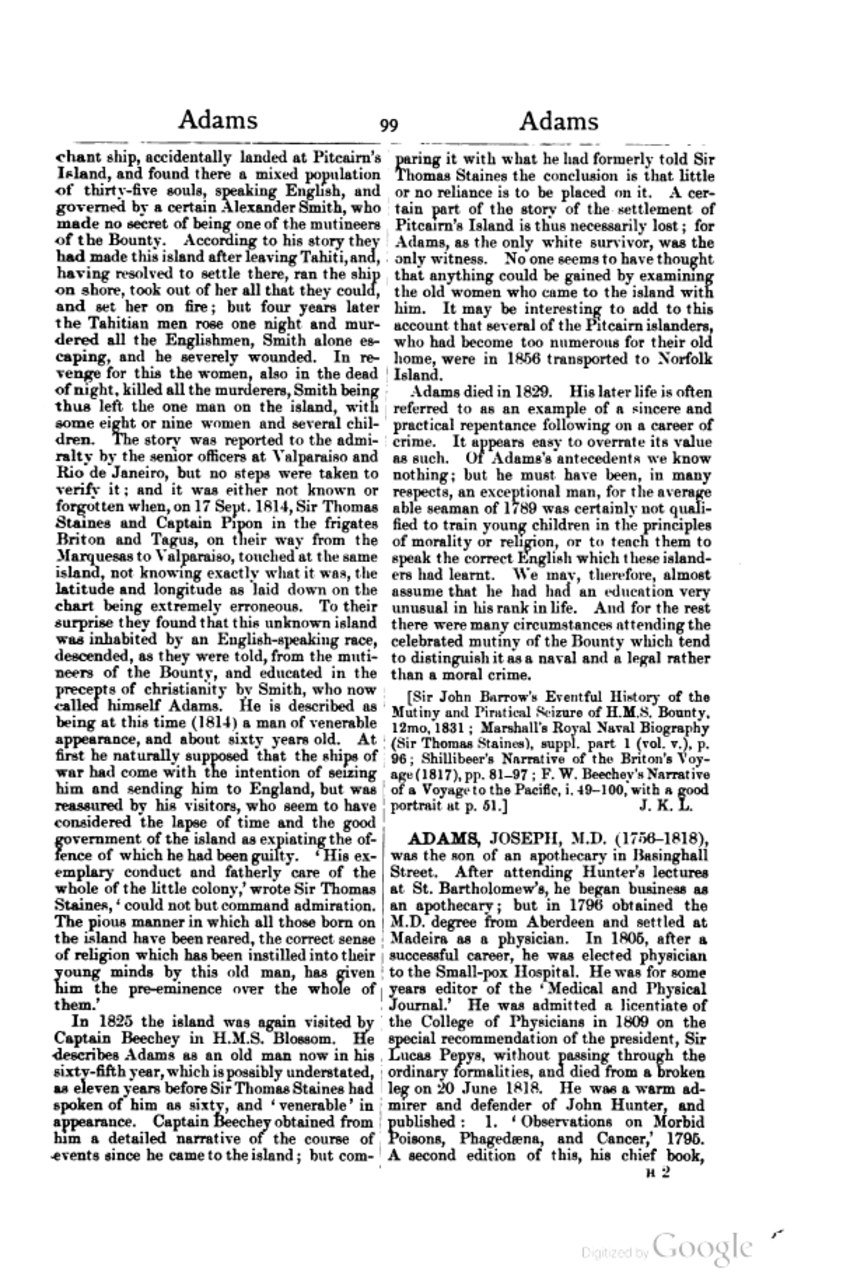chant ship, accidentally landed at Pitcairn's Island, and found there a mixed population of thirty-five souls, speaking English, and governed by a certain Alexander Smith, who made no secret of being one of the mutineers of the Bounty. According to his story they had made this island after leaving Tahiti, and, having resolved to settle there, ran the ship on shore, took out of her all that they could, and set her on fire; but four years later the Tahitian men rose one night and murdered all the Englishmen, Smith alone escaping, and he severely wounded. In revenge for this the women, also in the dead of night, killed all the murderers, Smith being thus left the one man on the island, with some eight or nine women and several children. The story was reported to the admiralty by the senior officers at Valparaiso and Rio de Janeiro, but no steps were taken to verify it; and it was either not known or forgotten when, on 17 Sept. 1814, Sir Thomas Staines and Captain Pipon in the frigates Briton and Tagus, on their way from the Marquesas to Valparaiso, touched at the same island, not knowing exactly what it was, the latitude and longitude as laid down on the chart being extremely erroneous. To their surprise they found that this unknown island was inhabited by an English-speaking race, descended, as they were told, from the mutineers of the Bounty, and educated in the precepts of christianity by Smith, who now called himself Adams. He is described as being at this time (1814) a man of venerable appearance, and about sixty years old. At first he naturally supposed that the ships of war had come with the intention of seizing him and sending him to England, but was reassured by his visitors, who seem to have considered the lapse of time and the good government of the island as expiating the offence of which he had been guilty. ‘His exemplary conduct and fatherly care of the whole of the little colony,’ wrote Sir Thomas Staines, ‘could not but command admiration. The pious manner in which all those born on the island have been reared, the correct sense of religion which has been instilled into their young minds by this old man, has given him the pre-eminence over the whole of them.’
In 1825 the island was again visited by Captain Beechey in H.M.S. Blossom. He describes Adams as an old man now in his sixty-fifth year, which is possibly understated, as eleven years before Sir Thomas Staines had spoken of him as sixty, and ‘venerable’ in appearance. Captain Beechey obtained from him a detailed narrative of the course of events since he came to the island; but comparing it with what he had formerly told Sir Thomas Staines the conclusion is that little or no reliance is to be placed on it. A certain part of the story of the settlement of Pitcairn's Island is thus necessarily lost; for Adams, as the only white survivor, was the only witness. No one seems to have thought that anything could be gained by examining the old women who came to the island with him. It may be interesting to add to this account that several of the Pitcairn islanders, who had become too numerous for their old home, were in 1856 transported to Norfolk Island.
Adams died in 1829. His later life is often referred to as an example of a sincere and practical repentance following on a career of crime. It appears easy to overrate its value as such. Of Adams's antecedents we know nothing; but he must have been, in many respects, an exceptional man, for the average able seaman of 1789 was certainly not qualified to train young children in the principles of morality or religion, or to teach them to speak the correct English which these islanders had learnt. We may, therefore, almost assume that he had had an education very unusual in his rank in life. And for the rest there were many circumstances attending the celebrated mutiny of the Bounty which tend to distinguish it as a naval and a legal rather than a moral crime.
[Sir John Barrow's Eventful History of the Mutiny and Piratical Seizure of H.M.S. Bounty, 12mo, 1831; Marshall's Royal Naval Biography (Sir Thomas Staines), suppl. part 1 (vol. v.), p. 96; Shillibeer's Narrative of the Briton's Voyage (1817), pp. 81–97; F. W. Beechey's Narrative of a Voyage to the Pacific, i. 49–100, with a good portrait at p. 51.]
ADAMS, JOSEPH, M.D. (1756–1818), was the son of an apothecary in Basinghall Street. After attending Hunter's lectures at St. Bartholomew's, he began business as an apothecary; but in 1796 obtained the M.D. degree from Aberdeen and settled at Madeira as a physician. In 1805, after a successful career, he was elected physician to the Small-pox Hospital. He was for some years editor of the ‘Medical and Physical Journal.’ He was admitted a licentiate of the College of Physicians in 1809 on the special recommendation of the president, Sir Lucas Pepys, without passing through the ordinary formalities, and died from a broken leg on 20 June 1818. He was a warm admirer and defender of John Hunter, and published: 1. ‘Observations on Morbid Poisons, Phagedæna, and Cancer,’ 1795. A second edition of this, his chief book,
